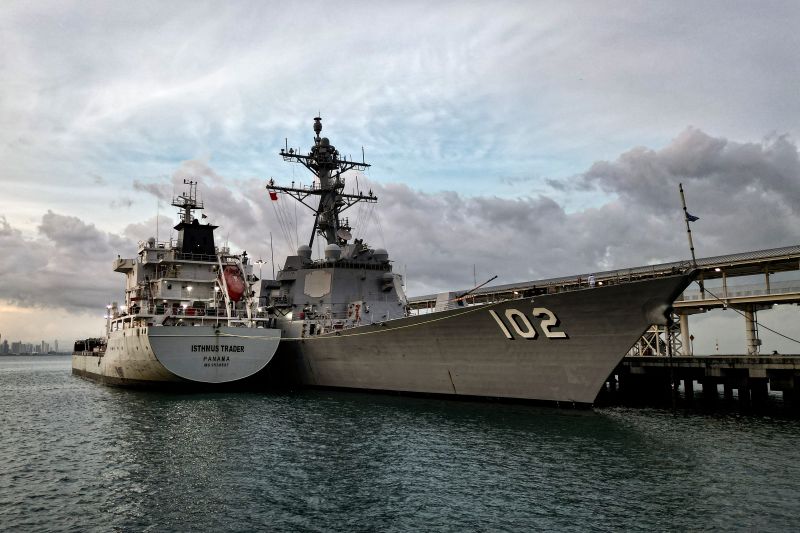The US released the two survivors of Thursday’s military strike on a suspected drug vessel in the Caribbean to their home countries of Ecuador and Colombia, President Donald Trump said Saturday.
Trump said it was his “great honor” to destroy a drug-carrying “submarine” with “four known narcoterrorists on board,” two of whom were killed.
“At least 25,000 Americans would die if I allowed this submarine to come ashore. The two surviving terrorists are being returned to their Countries of origin, Ecuador and Colombia, for detention and prosecution,” he posted on Truth Social. “Under my watch, the United States of America will not tolerate narcoterrorists trafficking illegal drugs, by land or by sea.”
Jeison Obando Perez, 34, was named as the survivor returned to Colombia in a post on X from the country’s interior minister Armando Benedetti. Perez arrived “with brain trauma, sedated, drugged, breathing with a ventilator,” Benedetti said, adding that he had received medical attention.
Benedetti called Perez a “criminal” who “will face justice for drug trafficking.”
Ecuador’s Ministry of the Interior said Saturday that it received one of the survivors. Authorities told CNN the survivor “is being medically evaluated.” They added that “the corresponding legal process will follow,” but gave no further details.
CNN reported earlier Saturday that the US was considering releasing the survivors to their home countries. Administration officials were scrambling to determine what to do with the individuals, the first known survivors of the six US military strikes carried out in the Caribbean since September.
The US military detained the survivors after the strike Thursday, marking the first time the Trump administration’s campaign targeting drug traffickers has resulted in the US holding prisoners.
Thursday’s strike was the sixth known strike on a boat allegedly involved in drug trafficking. It came as the US has deployed scores of military assets to the Caribbean as it promises further strikes on alleged drug boats, part of the administration’s effort to drive down drug flow into the US and pressure Nicolás Maduro, Venezuela’s authoritarian president.
The situation was potentially going to set up a legal and policy dilemma for the administration because it was unclear under what legal authority the US military can hold the prisoners, Brian Finucane, a former State Department lawyer who specializes in war powers issues, previously told CNN.
One of the sources told CNN the legally dubious situation is why the administration was considering releasing the individuals from US military custody.
The administration has produced a classified legal opinion that justifies lethal strikes against a secret and expansive list of cartels and suspected drug traffickers, CNN has reported. Historically, however, those involved in drug trafficking were considered criminals with due process rights, with the Coast Guard interdicting drug-trafficking vessels and arresting smugglers.
The Trump administration has also argued that the president has broad authorities under Article II of the Constitution to conduct the strikes against what it claims are “narco-terrorists,” but lawmakers on both sides of the aisle have questioned that theory. Congress, which maintains broad authority under Article I of the Constitution to declare war, has not authorized an armed conflict against drug traffickers.
Late Saturday night, Colombia’s President Gustavo Petro accused the United States of killing a fisherman in a separate, earlier, strike on a vessel.
“US government officials have committed a murder and violated our sovereignty in territorial waters,” Petro wrote in a post on X.
“Fisherman Alejandro Carranza had no ties to the drug trade and his daily activity was fishing,” he said, adding that the “boat was adrift and had its distress signal up due to an engine failure.”
Relatives of Carranza told state-owned TV channel RTVC Noticias that he was killed in a US strike on his fishing boat on September 15.
The family said the boat had set off from La Guajira, a peninsula on the northern border with Venezuela, and claimed the boat would not have been out of Colombian waters at the time of the attack, which killed the three people on board, the report said.
“We await explanations from the US government,” Petro wrote on X.
On September 15, President Trump announced a US strike had killed three “confirmed narcoterrorists from Venezuela in International Waters transporting illegal narcotics,” in a Truth Social post. He included video showing a boat sitting idle in the water before exploding into flames. It is the only strike the US has publicly acknowledged on that day.
CNN has asked the White House for comment.
Earlier this week, two people briefed by the Pentagon about the US strikes told CNN that at least one military strike in the Caribbean over the last two months had targeted Colombian nationals on a boat that had left from Colombia. The strike the sources identified was on September 19.
This story and headline have been updated with additional developments.
CNN’s Isa Cardona, Max Saltman, Ana María Cañizares, Anabella González and Isabel Tejera contributed to this report.
Source: edition.cnn.com



